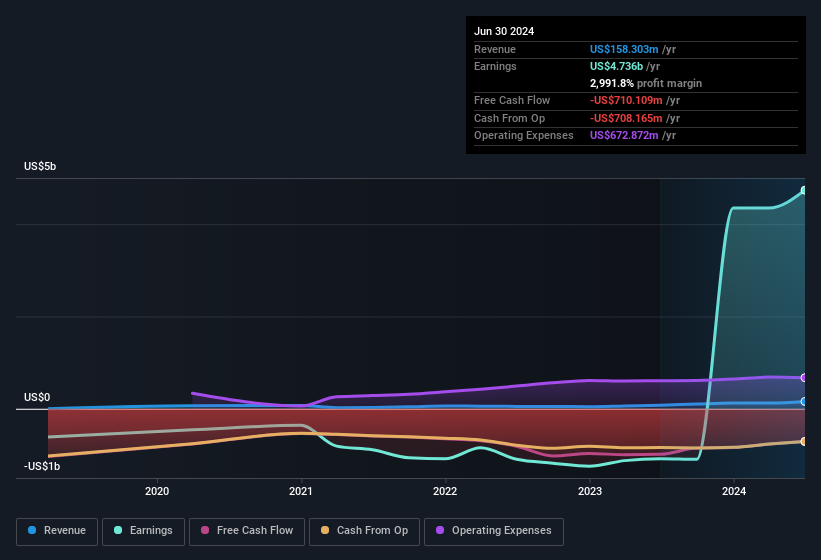- United States
- /
- Biotech
- /
- NasdaqGS:ROIV
Statutory Earnings May Not Be The Best Way To Understand Roivant Sciences' (NASDAQ:ROIV) True Position

Roivant Sciences Ltd. (NASDAQ:ROIV) recently released a strong earnings report, and the market responded by raising the share price. However, we think that shareholders should be aware of some other factors beyond the profit numbers.
View our latest analysis for Roivant Sciences

Zooming In On Roivant Sciences' Earnings
In high finance, the key ratio used to measure how well a company converts reported profits into free cash flow (FCF) is the accrual ratio (from cashflow). To get the accrual ratio we first subtract FCF from profit for a period, and then divide that number by the average operating assets for the period. This ratio tells us how much of a company's profit is not backed by free cashflow.
Therefore, it's actually considered a good thing when a company has a negative accrual ratio, but a bad thing if its accrual ratio is positive. That is not intended to imply we should worry about a positive accrual ratio, but it's worth noting where the accrual ratio is rather high. Notably, there is some academic evidence that suggests that a high accrual ratio is a bad sign for near-term profits, generally speaking.
Over the twelve months to June 2024, Roivant Sciences recorded an accrual ratio of 12.52. Statistically speaking, that's a real negative for future earnings. And indeed, during the period the company didn't produce any free cash flow whatsoever. In the last twelve months it actually had negative free cash flow, with an outflow of US$710m despite its profit of US$4.74b, mentioned above. We also note that Roivant Sciences' free cash flow was actually negative last year as well, so we could understand if shareholders were bothered by its outflow of US$710m. Having said that, there is more to the story. We can see that unusual items have impacted its statutory profit, and therefore the accrual ratio. The good news for shareholders is that Roivant Sciences' accrual ratio was much better last year, so this year's poor reading might simply be a case of a short term mismatch between profit and FCF. As a result, some shareholders may be looking for stronger cash conversion in the current year.
That might leave you wondering what analysts are forecasting in terms of future profitability. Luckily, you can click here to see an interactive graph depicting future profitability, based on their estimates.
How Do Unusual Items Influence Profit?
The fact that the company had unusual items boosting profit by US$5.4b, in the last year, probably goes some way to explain why its accrual ratio was so weak. While we like to see profit increases, we tend to be a little more cautious when unusual items have made a big contribution. When we crunched the numbers on thousands of publicly listed companies, we found that a boost from unusual items in a given year is often not repeated the next year. And, after all, that's exactly what the accounting terminology implies. We can see that Roivant Sciences' positive unusual items were quite significant relative to its profit in the year to June 2024. All else being equal, this would likely have the effect of making the statutory profit a poor guide to underlying earnings power.
Our Take On Roivant Sciences' Profit Performance
Summing up, Roivant Sciences received a nice boost to profit from unusual items, but could not match its paper profit with free cash flow. On reflection, the above-mentioned factors give us the strong impression that Roivant Sciences'underlying earnings power is not as good as it might seem, based on the statutory profit numbers. With this in mind, we wouldn't consider investing in a stock unless we had a thorough understanding of the risks. For example - Roivant Sciences has 2 warning signs we think you should be aware of.
Our examination of Roivant Sciences has focussed on certain factors that can make its earnings look better than they are. And, on that basis, we are somewhat skeptical. But there are plenty of other ways to inform your opinion of a company. For example, many people consider a high return on equity as an indication of favorable business economics, while others like to 'follow the money' and search out stocks that insiders are buying. So you may wish to see this free collection of companies boasting high return on equity, or this list of stocks with high insider ownership.
New: AI Stock Screener & Alerts
Our new AI Stock Screener scans the market every day to uncover opportunities.
• Dividend Powerhouses (3%+ Yield)
• Undervalued Small Caps with Insider Buying
• High growth Tech and AI Companies
Or build your own from over 50 metrics.
Have feedback on this article? Concerned about the content? Get in touch with us directly. Alternatively, email editorial-team (at) simplywallst.com.
This article by Simply Wall St is general in nature. We provide commentary based on historical data and analyst forecasts only using an unbiased methodology and our articles are not intended to be financial advice. It does not constitute a recommendation to buy or sell any stock, and does not take account of your objectives, or your financial situation. We aim to bring you long-term focused analysis driven by fundamental data. Note that our analysis may not factor in the latest price-sensitive company announcements or qualitative material. Simply Wall St has no position in any stocks mentioned.
About NasdaqGS:ROIV
Roivant Sciences
A clinical-stage biopharmaceutical company, focuses on the discovery, development, and commercialization of medicines and technologies.
Flawless balance sheet and slightly overvalued.
Market Insights
Community Narratives




